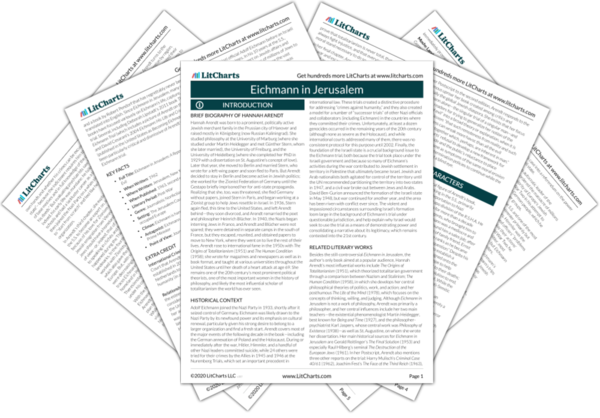Heinrich Himmler Quotes in Eichmann in Jerusalem
Eichmann, much less intelligent and without any education to speak of, at least dimly realized that it was not an order but a law which had turned them all into criminals. The distinction between an order and the Führer’s word was that the latter’s validity was not limited in time and space, which is the outstanding characteristic of the former. This is also the true reason why the Führer’s order for the Final Solution was followed by a huge shower of regulations and directives, all drafted by expert lawyers and legal advisers, not by mere administrators; this order, in contrast to ordinary orders, was treated as a law.

Unlock explanations and citation info for this and every other Eichmann in Jerusalem quote.
Plus so much more...
Get LitCharts A+Eichmann himself, after “consulting Poliakoff and Reitlinger,” produced seventeen multicolored charts, which contributed little to a better understanding of the intricate bureaucratic machinery of the Third Reich, although his general description—“everything was always in a state of continuous flux, a steady stream”—sounded plausible to the student of totalitarianism, who knows that the monolithic quality of this form of government is a myth.

Heinrich Himmler Quotes in Eichmann in Jerusalem
Eichmann, much less intelligent and without any education to speak of, at least dimly realized that it was not an order but a law which had turned them all into criminals. The distinction between an order and the Führer’s word was that the latter’s validity was not limited in time and space, which is the outstanding characteristic of the former. This is also the true reason why the Führer’s order for the Final Solution was followed by a huge shower of regulations and directives, all drafted by expert lawyers and legal advisers, not by mere administrators; this order, in contrast to ordinary orders, was treated as a law.

Unlock explanations and citation info for this and every other Eichmann in Jerusalem quote.
Plus so much more...
Get LitCharts A+Eichmann himself, after “consulting Poliakoff and Reitlinger,” produced seventeen multicolored charts, which contributed little to a better understanding of the intricate bureaucratic machinery of the Third Reich, although his general description—“everything was always in a state of continuous flux, a steady stream”—sounded plausible to the student of totalitarianism, who knows that the monolithic quality of this form of government is a myth.











